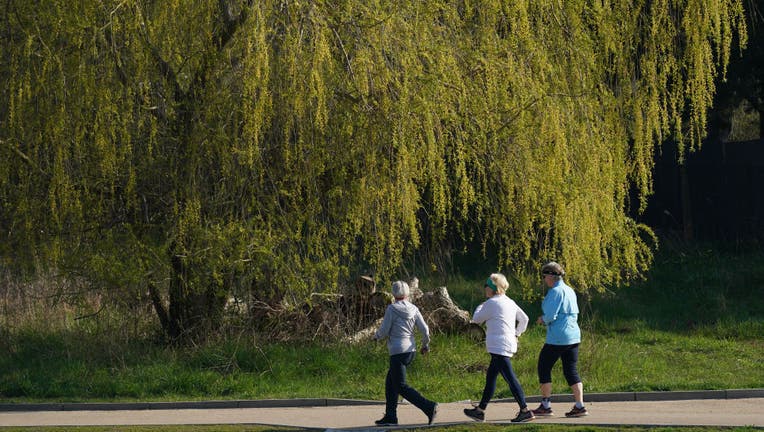Brisk walking may slow biological aging, study suggests

BERLIN, GERMANY - APRIL 20: Elderly women walk at a fast pace in a park during the third wave of the coronavirus pandemic on April 20, 2021 in Berlin, Germany. Outdoor exercise has for many people become vital during the ongoing pandemic lockdown for
LEICESTER, England - A new study has suggested a link between walking pace and a genetic marker of biological age.
The study was published Wednesday by the University of Leicester in Communications Biology.
Researchers studied the link between a person’s walking pace and leucocyte telomere length (LTL) — an indicator of biological age. Telomeres are "caps" at the end of chromosomes that protect the chromosomes from degrading. The more a cell divides, the shorter the telomeres. Shorter telomeres are an indication of older age.
RELATED: COVID-19 was 3rd leading cause of death in US in 2021, CDC reports
For the study, researchers studied genetic, self-reported data from more than 400,000 United Kingdom middle-aged adults between March 2006 and July 2010.
Nearly half the participants said they walked at an average/steady pace. More than 6% of participants reported walking at a slow pace. More than 41% of participants reported walking at a brisk pace. Slow-paced was defined as less than 3 miles per hour, a steady/average pace was between 3–4 miles per hour, and a brisk pace was more than 4 miles per hour.
Researchers found that steady/average and brisk walkers had significantly longer LTL compared to the slow walkers. They also found a number of health risks associated with slow walkers that prevented them from walking faster such as obesity.
"This suggests measures such as a habitually slower walking speed are a simple way of identifying people at greater risk of chronic disease or unhealthy ageing, and that activity intensity may play an important role in optimising interventions.," the study’s lead author Dr. Paddy Dempsey told Science Daily.
However, researchers stopped short of saying brisk walking causes better health, only saying they have established a link.
RELATED: UK patient had COVID-19 for 505 days straight, study shows
"Whilst we have previously shown that walking pace is a very strong predictor of health status, we have not been able to confirm that adopting a brisk walking pace actually causes better health," senior author Tom Yates told Science Daily. " In this study we used information contained in people's genetic profile to show that a faster walking pace is indeed likely to lead to a younger biological age as measured by telomeres."
This story was reported from Los Angeles.


